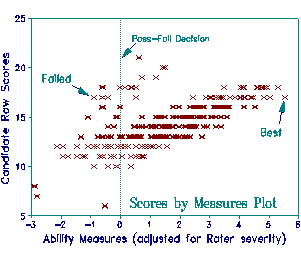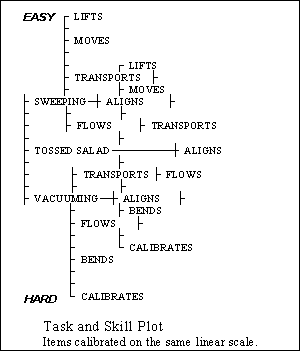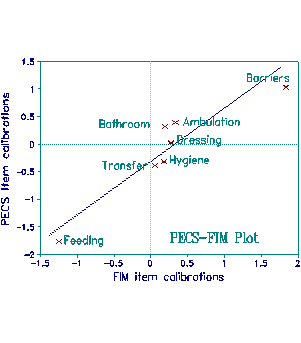


Patients and Rasch practitioners will benefit from the April 1993, American Journal of Occupational Therapy. This issue focusses on "alternative strategies for functional assessment", and includes 3 papers on Rasch measurement.
Guest editors, Margaret Short-DeGraff and Anne G. Fisher (Nationally Speaking - A Proposal for Diverse Research Methods and a Common Research Language, p.295-297), remedy the confusion surrounding such terms as qualitative, quantitative, assessment, evaluation, score, and measure by proposing definitions and encouraging authors to use the terms consistently. They note that "what one researcher might view as qualitative could well be considered quantitative by another", and decry the value judgements implied by labeling qualitative methods, "moral" and "feminine", but quantitative methods, "reductionistic" and "male". For measure, they recommend a definition related to Michell (1990): to determine quantitative differences in amounts based on the use of numeric "units of like kind", i.e., equal-interval units.
Lunz and Stahl (L&S, The Effect of Rater Severity on Person Ability Measure: A Rasch Model Analysis, p.311-317) launch an enthusiastic and skilled attack on the problem of differences in severity across raters, a topic of interest in OT because supervisors rate student's fieldwork performance, and therapists rate clients' task performance. In a judge-rated examination, L&S discover that the range of rater severity measures is about half that of candidate performance measures. This yields the disturbing possibility that raw scores of the best and worst candidate could coincide if they happen to be rated by the most severe and most lenient rater respectively! The Scores by Measures Plot shows that the actual situation was almost that bad. Candidates with the same raw score as the best candidate failed!
 |
 |
 |
L&S demonstrate that a many-facet Rasch model constructs measures adjusted for rater severity differences. They find that "raters vary markedly in their level of severity but tend to be consistent in that level of severity across candidates and protocols." With a Rasch model, "more control of the evaluation process can be exercised with regard to constructing items or protocols, training and providing feedback to raters, and providing reliable pass/fail decisions that are independent of the raters and items encountered."
Anne Fisher (The Assessment of IADL Motor Skills: An Application of Many- Faceted Rasch Analysis, p.319-329) writes a primer on many-facet Rasch measurement as she explains how she applied the methodology to develop the motor scale of the Assessment of Motor and Process skills. It is amazing that she can describe the theory behind her model, and then build a model for her observations, and finally calibrate a variable and measure the patients, all without inundating the reader with tables of numbers and algebraic formulae. Indeed, her only table of numbers appears at the end of her paper, clearly intended solely for those who plan to employ the methodology.
She utilizes her concept of linear "rulers", marked with calibrated items and tasks, to demonstrate how the different elements of four facets interact to generate observations. In her Task and Skill Plot, "Sweeping" is the easiest task and "vacuuming" the hardest. "Lifts" is the easiest item and "calibrates" the hardest. "Transports" on the "sweeping" task is about as easy as "lifts" on the "tossed salad". "Bends" on "vacuuming" is about as hard as "calibrates" on the "tossed salad". Even the most qualitatively-oriented therapist can grasp the message of such pictures.
William P. Fisher Jr. (Measurement-Related Problems in Functional Assessment, p.331-337) addresses the conceptual issue of "just what is good data?" He sees that stochastic conjoint order is essential to measurement and meaning. He attacks Stevens' sloppy scale definitions, pointing out that summing a hodge-podge of disparate ratings into a raw score does not produce a measure, indeed such a number can lack any meaning. He further proposes that meaning implies generality, so that meaningful measures must maintain their meaning when moved beyond the local context. He illustrates such generality by comparing in his PECS©-FIM® plot the calibrations for two sets of items in two different instruments that purport to measure the same thing. "The capacity to overcome the constraints of existing methods of assessment is not a matter of simply abandoning the old in favor of the new, but of turning implicit assumptions about numbers into explicit requirements for measurement."
John Michael Linacre
Michell J. 1990. Introduction to the logic of psychological measurement. Hillsdale NJ: Erlbaum
Therapeutic measurement. Fisher AG, Short-DeGraff M, Lunz ME, Stahl JA, Fisher WP Jr. Rasch Measurement Transactions 1993 7:3 p.301
Therapeutic measurement. Fisher AG, Short-DeGraff M, Lunz ME, Stahl JA, Fisher WP Jr. … Rasch Measurement Transactions, 1993, 7:3 p.301
| Forum | Rasch Measurement Forum to discuss any Rasch-related topic |
Go to Top of Page
Go to index of all Rasch Measurement Transactions
AERA members: Join the Rasch Measurement SIG and receive the printed version of RMT
Some back issues of RMT are available as bound volumes
Subscribe to Journal of Applied Measurement
Go to Institute for Objective Measurement Home Page. The Rasch Measurement SIG (AERA) thanks the Institute for Objective Measurement for inviting the publication of Rasch Measurement Transactions on the Institute's website, www.rasch.org.
| Coming Rasch-related Events | |
|---|---|
| Jan. 16 - Feb. 13, 2025, Fri.-Fri. | On-line workshop: Rasch Measurement - Core Topics (E. Smith, Winsteps), www.statistics.com |
| Apr. 8 - Apr. 11, 2026, Wed.-Sat. | National Council for Measurement in Education - Los Angeles, CA, ncme.org/events/2026-annual-meeting |
| Apr. 8 - Apr. 12, 2026, Wed.-Sun. | American Educational Research Association - Los Angeles, CA, www.aera.net/AERA2026 |
| May. 15 - June 12, 2026, Fri.-Fri. | On-line workshop: Rasch Measurement - Core Topics (E. Smith, Winsteps), www.statistics.com |
| June 19 - July 25, 2026, Fri.-Sat. | On-line workshop: Rasch Measurement - Further Topics (E. Smith, Winsteps), www.statistics.com |
The URL of this page is www.rasch.org/rmt/rmt73a.htm
Website: www.rasch.org/rmt/contents.htm